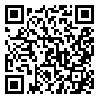Tue, Jan 27, 2026
[Archive]
Volume 39, Issue 1 (1-2025)
Med J Islam Repub Iran 2025 |
Back to browse issues page
Download citation:
BibTeX | RIS | EndNote | Medlars | ProCite | Reference Manager | RefWorks
Send citation to:



BibTeX | RIS | EndNote | Medlars | ProCite | Reference Manager | RefWorks
Send citation to:
Shabani A, Shariat S V, Noroozian M, Naserbakht M, Mohammadi M. Memory Function in Euthymic Patients with Bipolar I Disorder: A Cross-Sectional Study of Clinical and Demographic Correlates. Med J Islam Repub Iran 2025; 39 (1) :270-278
URL: http://mjiri.iums.ac.ir/article-1-9342-en.html
URL: http://mjiri.iums.ac.ir/article-1-9342-en.html
Mental Health Research Canter, Psychosocial Health Research Institute, Department of Psychiatry, School of Medicine, Iran University of Medical Sciences, Tehran, Iran , dr_mohammadimaryam@yahoo.com
Abstract: (1041 Views)
Background: Memory is one of the most affected cognitive domains in patients with Bipolar I Disorder, even during periods of euthymia. This study aimed to investigate the relationship between certain clinical and demographic variables and the domains of memory function in euthymic bipolar I patients.
Methods: This cross-sectional study included 100 patients who were confirmed to be euthymic at the time of the research, as indicated by Hamilton Depression Rating Scale scores (HDRS <7) and Young Mania Rating Scale scores (YMRS <12). Recruitment was conducted between March 2021 and March 2022. Their demographic data were collected, and all participants were evaluated for psychiatric comorbidities using the Structured Clinical Interview for DSM-5 (SCID-5-CV). Memory function was assessed using the Wechsler Memory Scale-3rd edition (WMS-3). The correlation between memory function and demographic and clinical variables was analyzed.
Results: The Wechsler Memory Scale total score was significantly associated with the number of hospitalizations, education level, and the number of depressive episodes. Notably, each additional hospitalization (β = -21.70 ± 8.18) and depressive episode (β = -23.36 ± 6.86) corresponded to a marked reduction in memory performance. The regression model demonstrated a robust fit, with an R-square value of 0.68.
Conclusion: Memory function is significantly correlated with the number of hospitalizations, level of education, and the number of previous depressive episodes in euthymic Bipolar I patients. This study underscores the importance of these factors in understanding and preventing memory impairment in this patient group.
Methods: This cross-sectional study included 100 patients who were confirmed to be euthymic at the time of the research, as indicated by Hamilton Depression Rating Scale scores (HDRS <7) and Young Mania Rating Scale scores (YMRS <12). Recruitment was conducted between March 2021 and March 2022. Their demographic data were collected, and all participants were evaluated for psychiatric comorbidities using the Structured Clinical Interview for DSM-5 (SCID-5-CV). Memory function was assessed using the Wechsler Memory Scale-3rd edition (WMS-3). The correlation between memory function and demographic and clinical variables was analyzed.
Results: The Wechsler Memory Scale total score was significantly associated with the number of hospitalizations, education level, and the number of depressive episodes. Notably, each additional hospitalization (β = -21.70 ± 8.18) and depressive episode (β = -23.36 ± 6.86) corresponded to a marked reduction in memory performance. The regression model demonstrated a robust fit, with an R-square value of 0.68.
Conclusion: Memory function is significantly correlated with the number of hospitalizations, level of education, and the number of previous depressive episodes in euthymic Bipolar I patients. This study underscores the importance of these factors in understanding and preventing memory impairment in this patient group.
Keywords: Bipolar Disorder, Memory Function, Euthymic Phase, Wechsler Memory Scale, Depressive Episodes
Type of Study: Original Research |
Subject:
Psychiatry
Send email to the article author
| Rights and permissions | |
 |
This work is licensed under a Creative Commons Attribution-NonCommercial 4.0 International License. |








